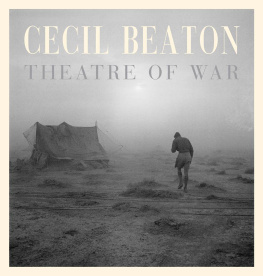Cecil Lewis - Sagittarius Rising: The Classic Account of Flying in the First World War
Here you can read online Cecil Lewis - Sagittarius Rising: The Classic Account of Flying in the First World War full text of the book (entire story) in english for free. Download pdf and epub, get meaning, cover and reviews about this ebook. genre: Detective and thriller. Description of the work, (preface) as well as reviews are available. Best literature library LitArk.com created for fans of good reading and offers a wide selection of genres:
Romance novel
Science fiction
Adventure
Detective
Science
History
Home and family
Prose
Art
Politics
Computer
Non-fiction
Religion
Business
Children
Humor
Choose a favorite category and find really read worthwhile books. Enjoy immersion in the world of imagination, feel the emotions of the characters or learn something new for yourself, make an fascinating discovery.
- Book:Sagittarius Rising: The Classic Account of Flying in the First World War
- Author:
- Genre:
- Rating:3 / 5
- Favourites:Add to favourites
- Your mark:
- 60
- 1
- 2
- 3
- 4
- 5
Sagittarius Rising: The Classic Account of Flying in the First World War: summary, description and annotation
We offer to read an annotation, description, summary or preface (depends on what the author of the book "Sagittarius Rising: The Classic Account of Flying in the First World War" wrote himself). If you haven't found the necessary information about the book — write in the comments, we will try to find it.
Cecil Lewis: author's other books
Who wrote Sagittarius Rising: The Classic Account of Flying in the First World War? Find out the surname, the name of the author of the book and a list of all author's works by series.
Sagittarius Rising: The Classic Account of Flying in the First World War — read online for free the complete book (whole text) full work
Below is the text of the book, divided by pages. System saving the place of the last page read, allows you to conveniently read the book "Sagittarius Rising: The Classic Account of Flying in the First World War" online for free, without having to search again every time where you left off. Put a bookmark, and you can go to the page where you finished reading at any time.
Font size:
Interval:
Bookmark:
home@page { margin-bottom: 5.000000pt; margin-top: 5.000000pt; }
Sagittarius Rising
The classic account of flying in the First World War
home@page { margin-bottom: 5.000000pt; margin-top: 5.000000pt; }
Sagittarius
Ninth sign of the zodiac, the Archer, governing voyages and weapons and all swift things. A fiery but divided sign, dominated by Jupiter, denoting in the character gaiety and a love of sport on the one hand, and on the other a power of prophecy and philosophy: which sign occurs in the horoscope of the autobiographer, rising.
home@page { margin-bottom: 5.000000pt; margin-top: 5.000000pt; }
Introduction
There are fortunate men to whom life is a continuous developing pattern, whose education leads them on to a career that carries them, almost in spite of themselves, to a place in the world from which, as their powers desert them, they withdraw to ease and seclusion, and whose final demise is as quiet and completing as the full stop at the end of a long and well-constructed sentence. Worthy men; good, useful men, no doubt; perhaps lucky men. There are many of them. In spite of the chaos of our time you constantly find them, self-insulated from doubts and speculations, from anything which might upset the steady flow of their little stream: complacent, comfortable, corpulent. There are moments when I envy them their unassailable security.
No such life has been mine For to me, and thousands like me, that easy developing pattern was completely thrown out of symmetry by the First World War. It took me from school at sixteen, it destroyed all hope of University training or apprenticeship to a trade, it deprived me of the only carefree years, and washed me up, unequipped for any serious career, with a Military Cross, a Royal handshake, a six-hundred-pound gratuity, and I almost forgot to say my life.
There were men older than I whose education was complete. To them the War was a setback, disastrous but not irremediable. There were others, older still, who had positions to which they could return. But we very young men had no place, actual or prospective, in a peaceful world. We walked off the playing fields into the lines. We lived supremely in the moment. Our preoccupation was the next patrol, our horizon the next leave. Sometimes jokingly as one discusses winning the Derby Sweep we would plan our lives 'after the War'. But it had no substantial significance. It was a dream conjecturable as heaven, resembling no life we knew. We were trained with one object to kill. We had one hope to live. When it was over we had to start again.
I do not complain of this. It was a fine introduction to life; but now, a step beyond the half-way house, that immense experience begins to fall into perspective as merely an episode. A great episode, of course; one that was to change the whole shape of civilization; but so different, so complete in itself, that now, at a distance of twenty years, my personal memories of it are quite detached as if they belonged to another life.
No doubt the psychologists have decided to what extent the shape of a man's life is dependent on the impact of his first adult experience. I observe (for what it is worth to them) that mine seems to fall into short complete blocks, that it is a repetitive not a running design, Chinese not Japanese; a theme, if you like, with variations. And in moments of depression, when I wish for a longer sweep to carry me safely into the sober years and find that, strangely, it eludes me, I console myself with the futile reflection: It's the War, my boy, it's the War.
This book is concerned with the first two of these lives, blocks, variations, or what you will. Both were over before I was twenty-four. Each, as I have said, was complete in itself, and might, from its remoteness to my present everyday life, have happened to somebody else. Did I, in fact, fly all through the long months of the Somme battle? Did I dive headlong, guns stuttering, into the Richthofen Circus that night Ball was killed? Did I range over darkened London, nervous under the antennae of her searchlights, hunting for Gothas? And did I, all that behind me, celebrate my twenty-first birthday four months after the Armistice? It seems I did.
Equally remote seem my two years in China. Two glorious, perfect years! Those crumbling palaces, those breathless courtyards, and the ghostly herons circling the Forbidden City in the dawn, did I, with these eyes, see all those things?
Well, here is my logbook lying on the desk. One thousand hours flying... fifty-three types of machines ... Here is my blackwood table, my lacquer, my jade... It must be so.
Now both those lives are over. In London the April rain drenches the roofs. The curtains are drawn. Within my study all is quiet and peaceful. The paper on which I write lies in a little pool of light, and my hand moves laboriously, back and across, back and across... Back and across the years! It is not easy. I kept no diaries, and memory, that imperfect vista of recorded thought, eludes and deceives. As in distorting mirrors at a fair, I can see myself long or stumpy, lean or fat, at will. Never my true self. Mercifully, no doubt.
Still, I can convey something after all. Not a connected narrative of adventure and heroism; rather, in a series of incidents and impressions, all that my mind remembers of the shape of those six years. Some of it perhaps will be inaccurate in detail, but broadly it is true. In case such things should be of interest, before they escape me further let me set them down.
home@page { margin-bottom: 5.000000pt; margin-top: 5.000000pt; }
1Training
I stood with Maynard Greville on the stone terrace outside the School House studies at Oundle in the spring of 1915.
'I vote we chuck all this at the end of term and join up,' said he.
'Wouldn't it be fine but they won't let us.'
'Why not? We're almost seventeen.'
'But old King says you can't get a commission in anything until you're eighteen.'
'Rot! What about the Flying Corps? They'll take you at seventeen. They want young chaps.'
'Shall we speak to Beans?'
'No, he might stop us. I vote we write to the War Office and see what happens.'
'All right! Oh, Maynard, wouldn't it be ripping!'
*
It took us a long time to get those letters right.
'We mustn't let it look too much like kids; but it wants to sound keen and all that.'
'We ought to type it, really.'
'What's the good of saying that when we haven't got a typewriter?'
'Ashworth might lend us his.'
'And tell the Head afterwards No, thanks.'
At last the letters were sent off. An agonizing wait followed. In our impatience and excitement it seemed incredible the War Office didn't reply by return of post. Surely the chance of getting two keen young chaps was not to be missed?
When the buff envelopes arrived, a week later, we had given up all hope. We retired excitedly to our study and shut the door. We might have been conspirators. Certainly no spies ever observed greater secrecy in opening their official instructions than we did in concealing our intention to serve our country. The paper heading was enough to start the heart pounding: 'WAR OFFICE, WHITEHALL.' And then the formal opening: DEAR SIR, I am in receipt of your communication of the inst . We raced through the rest; then with a whoop began to dance wildly round the study.
'They'll see us! They'll see us They haven't turned us down. Good egg.
'And I say, look at this: "I have the honour to be, sir, your obedient servant " Isn't that comic? He wouldn't finish up like that unless he really wanted us.'
Rot! All those johnnies end their letters like that. They have to.'
'We're going to be pilots! We're going to be pilots! Hurrah!'
Next pageFont size:
Interval:
Bookmark:
Similar books «Sagittarius Rising: The Classic Account of Flying in the First World War»
Look at similar books to Sagittarius Rising: The Classic Account of Flying in the First World War. We have selected literature similar in name and meaning in the hope of providing readers with more options to find new, interesting, not yet read works.
Discussion, reviews of the book Sagittarius Rising: The Classic Account of Flying in the First World War and just readers' own opinions. Leave your comments, write what you think about the work, its meaning or the main characters. Specify what exactly you liked and what you didn't like, and why you think so.









